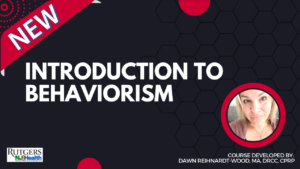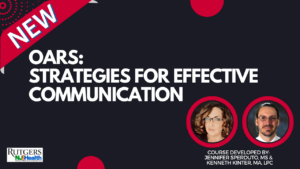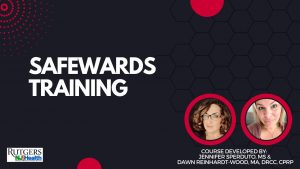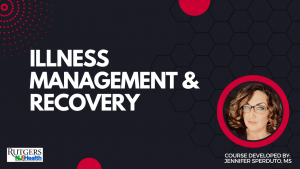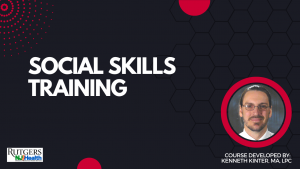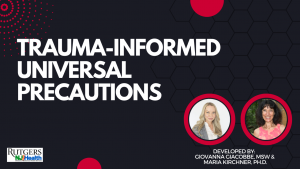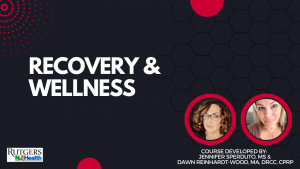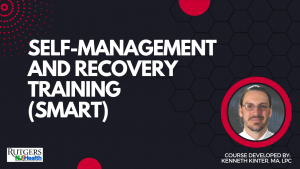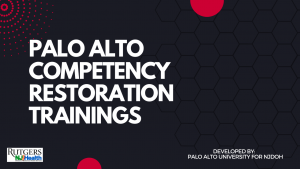Rutgers/DBHS Continuing Education
The Rutgers/DBHS Continuing Education courses are for NJDOH hospital staff only.
Click on a course below for registration information. If you need to access password-protected pages, please contact your hospital’s training department or your friendly SHPRI faculty member for the password.
If you have already registered, click here to access any of the courses: Canvas Login
Courses
Developed by: Giovanna Giacobbe, MSW
This innovative training video offers a dynamic and accessible exploration of the Autonomic Nervous System (ANS) through a creative lens that integrates storytelling, metaphors, and evidence-based insights. By blending imaginative direction with humor, this training provides a unique educational experience that supports both cognitive and embodied learning. Grounded in current research on trauma and neurobiology, the training illustrates how the body responds to stress and trauma, offering practical tools for self-regulation, establishing safety, and co-regulation.
Developed by: Dawn Reinhardt-Wood, MA & Jennifer Sperduto, MS
This course will provide an overview of mental illness, its causes, treatment, and common symptoms exhibited by people in inpatient psychiatric hospitals — important concepts foundational to working with individuals recovering from mental health conditions. We will look at the practical facts about mental illness and identify ways in which we can support individuals through their recovery journey.
Developed by: Tom Bartholomew, PhD. and Jennifer Sperduto, MS
This course will introduce you to an important strategy in violence prevention called Three Steps to Safety. Upon completion of this course, students should be able to: Identify the types and causes of inpatient violence, describe the analogy of creating a “Relationship Bank Account” with clients, identify the Three Steps to Safety and explain what it means to Validate, Explain and Problem Solve, and demonstrate the Three Steps to Safety.
Developed by: Jennifer Sperduto, MS & Kenneth Kinter, MA, LPC
This course will introduce you to the therapeutic communication techniques known as OARS. OARS represents communication strategies that can help a practitioner engage in therapeutic communication in a variety of ways: group settings, individual interactions, and are useful tools for de-escalation.
Developed by: Jennifer Sperduto, MS and Dawn Reinhardt-Wood, MA, DRCC
This course will introduce you to Safewards as a multidimensional model for reducing violence in a hospital setting. Safewards is a program that encourages staff and patients to work together to make the hospitals safer for everyone. Safer means a calmer and more positive place. Safewards uses 10 simple strategies that staff and patients can use to decrease conflict.
Developed by: Jennifer Sperduto, MS ……………….
This course will introduce you to the Illness Management and Recovery (IMR) program as an evidence-based practice which helps individuals develop tools to manage their mental health conditions, set meaningful goals and make progress towards their personal recovery.
Developed by: Kenneth Kinter, MA, LPC
The purpose of this training is to teach you to utilize Social Skills Training for Schizophrenia (Bellack et al., 2004) and the Social Skills Group Manual (Kinter & Sperduto, 2022) to facilitate more effective social skills groups. This training should take you approximately 60 minutes and contains exercises, video clips, and knowledge assessments.
Developed by: Giovanna Giacobbe, MSW and Maria Kirchner, Ph.D.
This course will introduce you to 5 Universal Precautions staff must use when interacting with patients to prevent trauma and re-traumatization from occurring at our hospitals. These precautions are to be used in our everyday communications with patients and our fellow colleagues to begin to establish a Trauma-Informed Culture. We will explore these 5 Trauma-Informed Universal Precautions and demonstrate how to apply them to create an environment that promotes a safety, collaboration, mutual respect and most importantly, healing to the people we serve.
Developed by: Jennifer Sperduto, MS and Dawn Reinhardt-Wood, MA, DRCC
This course will provide an overview of Recovery and Wellness — two important concepts foundational to working with individuals recovering from mental health conditions. Just as every individual is unique, the supports that help people recover and maintain their overall psychiatric and general health should also be person-centered and individualized to the person in recovery. We will look at the basics of Recovery and Wellness and identify ways in which we can support individuals through their recovery journey.
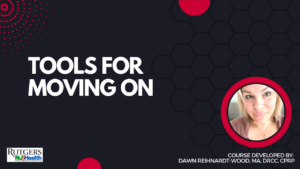 Developed by: Dawn Reinhardt-Wood, MA, DRCC
Developed by: Dawn Reinhardt-Wood, MA, DRCC
This course will provide an overview of Tools for Moving On (TFMO), a group curriculum for use in inpatient psychiatric settings to prepare patients for transition to community living and more successful discharges. This course will prepare you to facilitate TFMO in group or individual settings. TFMO was adapted by Rutgers University from SAMHSA’s Tools for Tenants Toolkit content.
Developed by: Palo Alto University for NJ DOH
The Palo Alto University curriculum, developed for the New Jersey Department of Health, is an on-demand professional training intended for mental health and other allied health professionals. The self-paced courses are designed for beginner, intermediate, and advanced level clinicians.
